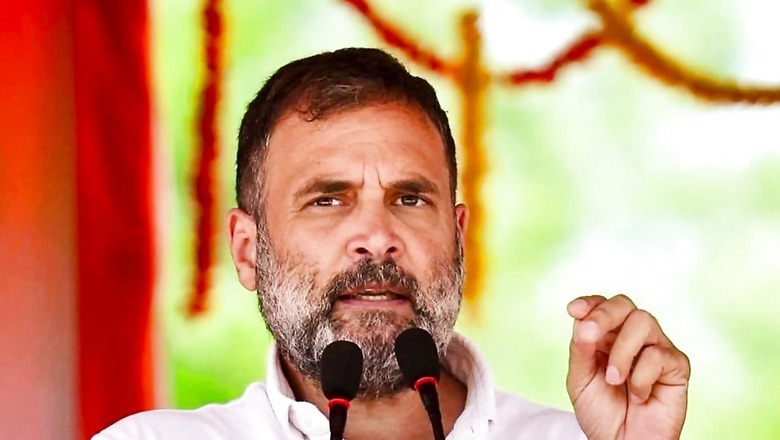
views
Socialism is like the Sirens of Greek mythology—the half-bird and half-woman creatures who lured sailors to their doom by singing sweet songs. It continues to entice people, intellectuals, and politicians. Congress leader Rahul Gandhi is among the politicians whose fascination with socialism and its perverse theories is so ingrained that he is unable to notice that the statements he is making undermine his own party’s position.
So, speaking at Panchkula in Haryana on Wednesday, he said that 90 per cent of the population comprising “Dalits, Adivasis, OBCs and minorities” are unrepresented across different fields. He went on to assert that there are “two different sets of rules.” Also, the “system is aligned against lower castes.”
Gandhi reportedly said, “I have been sitting inside the system since birth. I understand the system from the inside. You cannot hide the system from me. How it works, who it favours, how it favours, who it protects, who it attacks, I know everything, I can see it as I have come from inside it. At the Prime Minister’s house, when my grandmother (Indira Gandhi) was the PM, Papa (Rajiv Gandhi) was there, Manmohan Singh ji was there, I used to go… I know the system from the inside. And I am telling you, the system is aligned against lower castes, in a terrifying manner (bhayankar tareeke), at every level. Look at the corporate system, media system, bureaucracy, judiciary, education system, and military. Wherever you look, there is no participation of 90 per cent. And an argument is raised about merit. How is it possible that 90 per cent don’t have merit? It is just not possible. There has to be some flaw in the system.”
Evidently, in the last 10 years, Rahul has not been “sitting inside the system”, which means that he has been referring to the 67 years between 1947 and 2014. But during this period, his party was in power for 55 years. The implication of these two indubitable facts is that the grand old party was primarily responsible for the supposed marginalisation of nine out of ten Indians.
I didn’t compare socialism with the Sirens without reason. Just as their songs doom sailors, the promises of socialism are so sweet and its charms so meretricious—food and house for all, elimination of poverty, heaven on Earth, in short—that many politicians get hopelessly enticed by them. The temptation is so intense that they lose contact with reality.
Rahul’s Leftward march has made him enter into such a realm. Otherwise, he would have realised that his remarks alluding to the supposed marginalisation of 90 per cent of people show his own party in a bad light. I say “supposed” because the Congress did play a critical role in the modernisation of India. Like any other party, it also made mistakes, but the marginalisation of 90 per cent of people was not one of them.
The marginalisation charge also flies in the face of facts in a country where the top two offices, that of the president and the vice president, are held by persons from the 90 per cent.
On one point, though, Rahul’s observation is accurate: “There has to be some flaw in the system.” Of course, he would loath to accept the correct diagnosis, for that flaw is socialism. His great-grandfather, Jawaharlal Nehru, foisted it upon the country in the early years of independence, resulting in the amplification of the size and scope of the state and the concomitant miniaturization of the individual. The very first amendment to the Constitution, carried out a year before even the first general elections were held, resulted in the curtailment of two Fundamental Rights—freedom of expression and property. Events in the following years extinguished the right to property as a fundamental right; it was reduced to a legal right.
It was under the Congress governments that the grip of socialism began to loosen in India. First, Indira Gandhi initiated reforms in the early 1980s, followed by Rajiv Gandhi in the late 1980s. Finally, under P.V. Narasimha Rao, the worst aspects of socialism were done away with. But, unfortunately, the presence and toxicity of socialism is such that even over three decades of economic reforms and the marginalisation of Left-leaning economists and policymakers, we suffer from it.
Socialism didn’t just harm the economy, arrest development, and perpetuate poverty; it also contaminated mores, perverted public discourse, distorted political debate, and constrained imagination. This toxic ideology condemned political and intellectual elites to a statist mindset, where collectivism reigned supreme.
Rahul Gandhi is among those who don’t want to escape this perdition. Even if this results in making statements that demean his own party. With such adversaries, does Narendra Modi need any allies?
The author is a freelance journalist. Views expressed in the above piece are personal and solely that of the author. They do not necessarily reflect News18’s views.




















Comments
0 comment